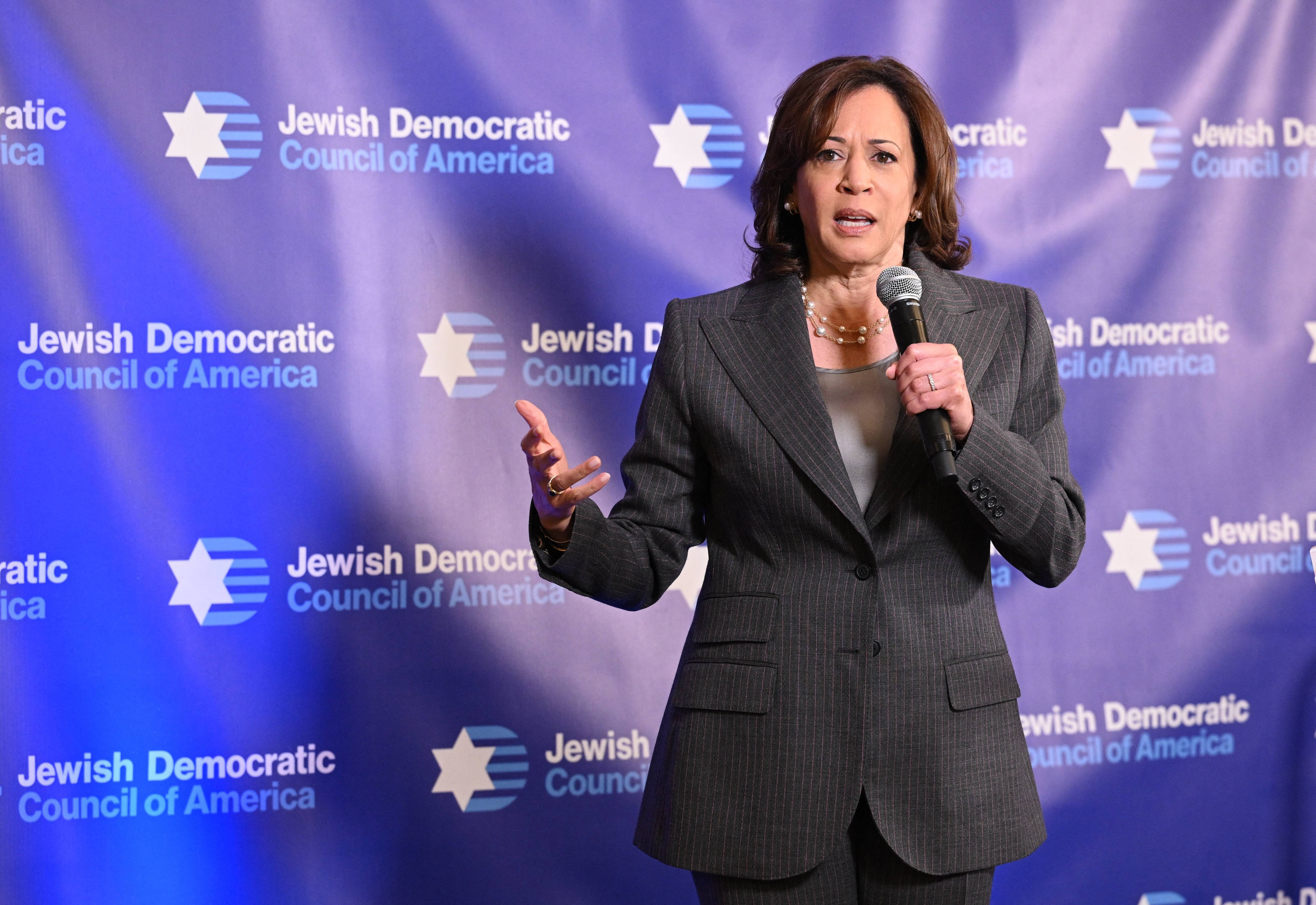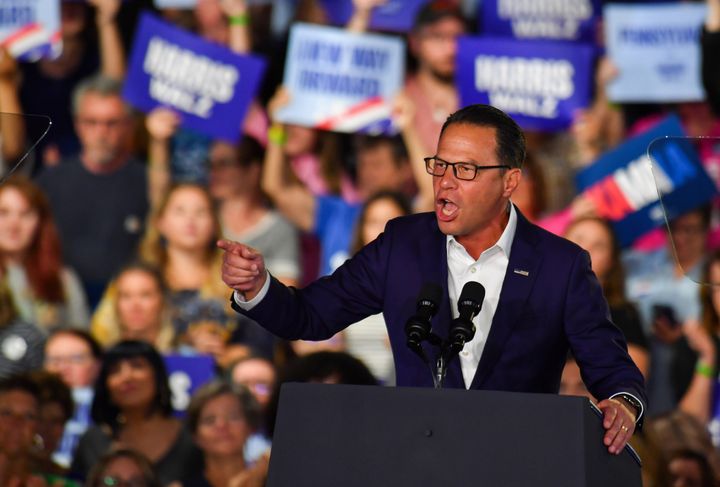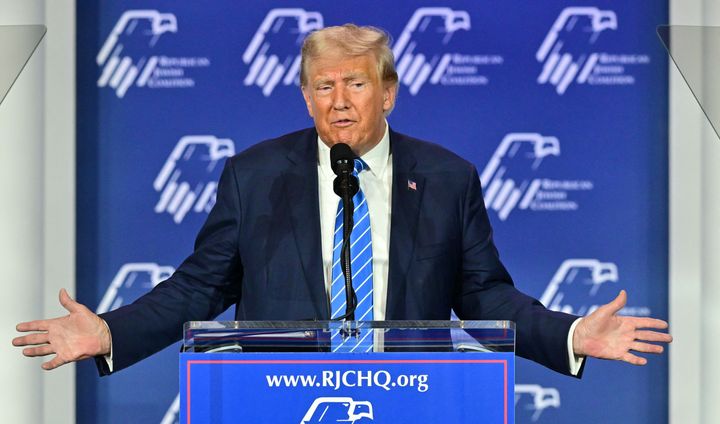
LOWER MERION, Pennsylvania ― A Jewish group which played a key role in the ouster of progressive Rep. Jamaal Bowman (D-N.Y.) earlier this year is now targeting Pennsylvania in the presidential race, aiming to put on a formally nonpartisan show of Jewish voters’ power in the state most likely to decide the 2024 presidential election.
Pennsylvania Unites, as the initiative is known, officially launched its general-election effort on Monday, announcing the opening of its field office in the heavily Jewish Philadelphia suburb of Lower Merion township. The get-out-the-vote program, put on by the Modern Orthodox Jewish umbrella group Orthodox Union will have a budget of $250,000, two dedicated staffers, and an untold number of volunteers.
Politicians are “going to see that this is a community that votes and votes at a super-majority rate, and punches above their weight,” said Maury Litwack, executive director of Teach Coalition, the Orthodox Union’s private education and voter turnout advocacy branch. “They’ll say to themselves, ‘OK, this is a group that I have to pay attention to.’”
Jewish voters are traditionally heavily Democratic, though former GOP President Donald Trump has attempted to woo them with unrelenting support of Israel’s invasion of the Gaza Strip and his record of support for Israel as president. He insists Vice President Kamala Harris will kowtow to the Democratic Party’s left wing, which is increasingly skeptical of a war that has killed over 40,000 Palestinians.
At the very least, the effort aims to prove Jewish votes can be crucial in deciding a presidential contest and force politicians to focus on combating a spike in antisemitism. In the eyes of some liberal Jews, however, the program seems aimed at moving Jewish voters into the Republican column.
“I’m sure it’s cast as making sure both candidates are as attentive to Jewish needs as possible, but when you read between the lines, it looks like it’s geared toward getting out the vote on behalf of the conservative candidate in the race,” said David Myers, chair of the Jewish history department at UCLA, and an expert in Orthodox Jewish political views. “What most will read in that effort is ‘vote for the candidate who is undeniably supportive of Israel.’”
The result is to complicate an already-complicated balancing act for Harris, who needs to alleviate some Jewish voters’ concerns over her support for Israel and also avoid alienating the growing number of Democrats, including in the Arab American and Muslim communities in Michigan, who want to see the U.S. take a much harsher line with Israel. She has given hardly any concessions on the topic to the left wing of her party, refusing activists’ demand for a Palestinian-American speaker at the Democratic national convention.
“It’s not close with the Jewish vote. It’s just a question of how badly the Republican loses it,” admitted Ari Fleischer, a prominent Jewish Republican who served in the George W. Bush administration and was campaigning with Republican Senate candidate Dave McCormick outside Philadelphia on Tuesday.

“The Jewish vote’s on the move this election, but the move means going from 25% to 30% or 32%,” Fleischer added. “That’s how you win ― get a little more of the Black vote, a little more of the Hispanic vote, a little more of the Jewish vote, and it can offset how they’re doing with college-educated women.”
Teach Coalition’s highest-profile state operation in recent months was undoubtedly its Westchester Unites organizing program in suburban New York this past June. Even though the nonpartisan group did not endorse a candidate in the race, Westchester Unites’ community-wide field operation played a pivotal role in ousting Democratic Rep. Jamaal Bowman, whose vehement criticism of Israel sparked accusations of antisemitism and opposition from even otherwise left-leaning Jewish voters.
Then as now, the message was simple: If you want to combat antisemitism, “Don’t kvetch. Vote.”
Although Teach Coalition is nonpartisan, its primary focus is obtaining public resources for the religious private schools of its constituents ― whether through vouchers, tax credits for scholarships or funding for school security ― an agenda typically associated with social conservatives.
And of course, while the vast majority of Jewish Americans identify as Democrats and voted for Biden in 2020, Orthodox Jews are a mirror image, with a nearly equally high proportion leaning Republican and voting for Trump.
“I think the Jewish vote is going to be pretty critical to winning the presidency.”
- Maury Litwack, executive director, Teach Coalition
To bolster its case that Jewish voters are up for grabs, however, Teach Coalition released a poll of Pennsylvania Jews in early August showing Harris leading Trump 55% to 43% ― an unusually small lead for a Democratic candidate.
“I would expect both candidates to do everything they can,” Litwack said. “I think the Jewish vote is going to be pretty critical to winning the presidency.”
Other national polls show a more standard lead for Harris: Harris is ahead of Trump among Jewish voters 68% to 25%, according to a Jewish Democratic Council of America poll earlier this month, which was conducted by the Democratic polling firm GBAO.
“Donald Trump has made zero inroads with Jewish voters since 2016,” said Halie Soifer, the CEO of JDCA, who served as national security advisor to Harris while she was in the Senate.
“And he’s clearly frustrated with this fact, because he continues to denigrate millions of American Jews at an alarming rate,” added Soifer, referring to Trump’s claims that Jewish Democrats are self-hating.
At the same time, the group is not taking chances, and plans to spend more than $1 million on digital advertisements targeting Jewish voters in Pennsylvania and other swing states.
Where Pennsylvania Unites is likely unique is in its ability as a nonpartisan nonprofit to mount a field and relational organizing operation centered on Pennsylvania’s synagogues and other Jewish institutions.
Whether the effort significantly affects the outcome of the election is another question. One reason it might: Teach Coalition’s constituency of Modern Orthodox Jews ― a group that blends strict religious observance with modern attire and secular education ― is likely the closest thing to a swing voting bloc in American Jewish life.
Much of the Republican skew of Orthodox Jewry overall comes from Ultra-Orthodox Jews, who are overwhelmingly concentrated in New York and New Jersey. In Pennsylvania, Modern Orthodox Jews, whose politics are more centrist and varied, are a far larger share of the total Orthodox population.
In 2020, 65% of Modern Orthodox Jews nationwide reported voting for President Joe Biden, compared to 35% for Donald Trump, according to polling conducted by Myers and Mark Trencher, president of Nishma Research, a Jewish polling firm.

This year, Harris is leading Trump among Modern Orthodox Jews, 54% to 46%, according to preliminary polling by Myers and Trencher the pair shared with HuffPost and that will be released to the public later this month. That is down from 60% who were planning to vote for Biden in a February poll.
Pennsylvania Unites’ basement-level field office in Lower Merion was still coming together last week, but there were already maps on the walls of key Pennsylvania counties and their municipalities, scripts for phone banking, and packets with lists of voters and their contact information.
Among the volunteers, antisemitism was top of mind. Since Orthodox Jews are visibly Jewish ― for males, in particular, the kipah head covering is a giveaway ― they are often the group of Jews most affected by anti-Jewish acts, and serve as an early indicator of rising prejudice.
Sara Hirsch said her son was cursed out by a passing driver while walking to synagogue the previous Saturday. “That’ll be something that my children feel and that I never felt until recently,” she said.
And while there was some acknowledgment of the right-wing antisemitism plied by figures like Candace Owens, the people in the room seemed wariest of the kind of antisemitism they see as emerging from pro-Palestinian activism.
Robert Morgenstern, a billing manager for a software company, suggested he would benefit from a “preview” of who Harris would pick as secretary of state, and information about whether Ben Rhodes, a dovish Obama administration national security official whom Morgenstern dislikes, might have a place in Harris’s administration.
“I am going to be very opposed to that [and to] the notion that Iran can be negotiated with as if they’re a rational actor,” he said.
Yisraela Haor Friedman, a realtor who moved to the U.S. from Venezuela, expressed concerns about Trump’s legal troubles and his continued defense of his behavior on Jan. 6, 2021. She still wants more assurances from Harris about her vision for Israeli security, though.
“When you say ‘rebuild Gaza’ ― at one point we need to deal with that,” Haor Friedman said. “But what are we doing to make sure they will never go into [Israel]?”
Asked whether they were disappointed Harris had not picked Pennsylvania Gov. Josh Shapiro, a traditional Jew, as her running mate, the room responded with a cacophony of responses indicating that they were.
“I was heartbroken,” Haor Friedman said.
In Trencher and Myers’ forthcoming poll, about 25% of Modern Orthodox voters backing Trump said they would reconsider if Shapiro had been on the ticket.
But Shapiro remains her most prominent Jewish surrogate in the state. He told an Israeli reporter after the debate on Tuesday night that he is confident in Harris’s support for Israel.
“Listen, for the Palestinians, they need to make clear that violence has no part in the relationship with Israel, that Israel has a right to exist,” Shapiro said. “We need to get back to that kind of conversation. And I felt what the vice president did, laying that out, was really effective.”
Disclaimer: The copyright of this article belongs to the original author. Reposting this article is solely for the purpose of information dissemination and does not constitute any investment advice. If there is any infringement, please contact us immediately. We will make corrections or deletions as necessary. Thank you.
